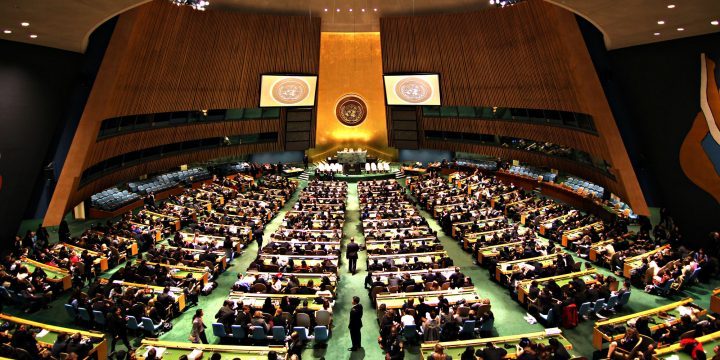Heads of state and Foreign Ministers will sign the Treaty on the Prohibition of Nuclear Weapons tomorrow, 20 September 2017, as the General Assembly of the United Nations opens in New York.
With tensions continuing to grow between the US and North Korea, the risk of the use of nuclear weapons – with all the devastating humanitarian consequences that would entail – is higher than ever. At the United Nations General Assembly, US President Trump said, “If the United States is forced to defend itself, we will have no choice but to totally destroy North Korea.”
In this context, the signing the Treaty on the Prohibition of Nuclear Weapons will be a powerful way for states around the world to take a stand against nuclear weapons and offer the international community a way to rid the world of this inhumane and unacceptable weapon.
“For decades nuclear weapons have remained the only weapons of mass destruction not yet prohibited despite their immense destructive power and threat to humanity, and nuclear-armed states are still threatening to use them to wipe our cities and hundreds of thousands of civilians. Today states that sign the treaty will demonstrate their commitment to a world without nuclear weapons by making them illegal”, said Beatrice Fihn, Executive Director of ICAN.
The Treaty on the Prohibition of Nuclear Weapons bans the use, threatening to use, production, development, stationing, and testing of nuclear weapons; forbids assistance will all of prohibited activities, and requires the provision of assistance to victims and remediation of polluted land from nuclear weapon use and testing. With the adoption of the TPNW, nuclear weapons finally join biological and chemical weapons as weapons of mass destruction that have been declared illegal under international law.
Around 45 states are expected to sign the treaty on the opening day, with more states due to sign in the following days of the UN General Assembly. The treaty will enter into force following the 50th ratification.
“This Treaty is the beginning of the end for nuclear weapons”, said Setsuko Thurlow, a survivor of the atomic bombing of Hiroshima in 1945. “For those of us who have survived the use of nuclear weapons, this Treaty gives us hope,” she continued.
The treaty emerged from a process that has refocused the world’s attention over the risks over nuclear weapons due which can wipe out entire cities, and harm people and contaminate land over generations. The treaty will enter into force following the 50th ratification.
The treaty negotiations were boycotted by nuclear-armed states, who unsuccessfully sought to derail the process. Despite their absence, this treaty is a clear indication that the majority of the world no longer accepts nuclear weapons, and creates a new norm that can be the foundation for their elimination. As has been true with previous weapon prohibition treaties, including those banning anti-personnel landmines and cluster munitions, a strong new international norm can lead to concrete changes in policies and behaviours, even in states not party to the treaty.










